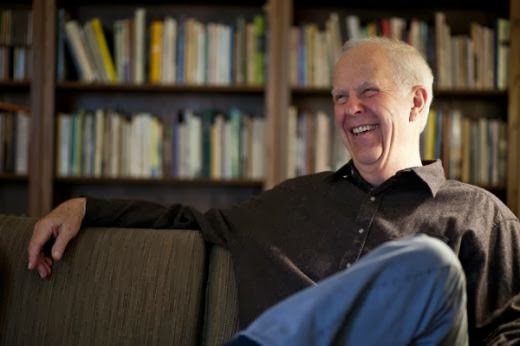There's a miracle story about loaves and fishes. It's the only miracle story that appears in all four gospels. It, too, is a lesson about abundance.
Today, The Liberal Pulpit puts the ancient (Mark 6: 30-42) and contemporary into dialog with each other. We interweave Parker Palmer (indented) and the Gospel of Mark (italics). Note the convergence: what Palmer tells ("trust its supply and pass it around"), Jesus shows.
Nature normally takes us through a reliable cycle of scarcity and abundance in which times of deprivation foreshadow an eventual return to the bountiful fields. This fact of nature is in sharp contrast to human nature, which seems to regard perpetual scarcity as the law of life. Daily I am astonished at how readily I believe that something I need is in short supply. If I hoard possessions, it is because I believe that there are not enough to go around. If I struggle with others over power, it is because I believe that power is limited. If I become jealous in relationships, it is because I believe that when you get too much love, I will be short-changed. The irony, often tragic, is that by embracing the scarcity assumption, we create the very scarcities we fear.The apostles gathered around Jesus, and told him all that they had done and taught. He said to them, “Come away to a deserted place all by yourselves and rest a while.” For many were coming and going, and they had no leisure even to eat. And they went away in the boat to a deserted place by themselves. Now many saw them going and recognized them, and they hurried there on foot from all the towns and arrived ahead of them. As he went ashore, he saw a great crowd; and he had compassion for them, because they were like sheep without a shepherd; and he began to teach them many things.
When it grew late, his disciples came to him and said, “This is a deserted place, and the hour is now very late; send them away so that they may go into the surrounding country and villages and buy something for themselves to eat.”
But he answered them, “You give them something to eat.”
If I hoard material goods, others will have too little and I will never have enough. If I fight my way up the ladder of power, others will be defeated, and I will never feel secure. If I get jealous of someone I love, I am likely to drive that person away. We create scarcity by fearfully accepting it as law and by competing with others for resources as if we were stranded in the Sahara at the last oasis.They said to him, “Are we to go and buy two hundred denarii worth of bread, and give it to them to eat?”
And he said to them, “How many loaves have you? Go and see.”
When they had found out, they said, “Five, and two fish.” Then he ordered them to get all the people to sit down in groups on the green grass. So they sat down in groups of hundreds and of fifties. Taking the five loaves and the two fish, he looked up to heaven, and blessed and broke the loaves, and gave them to his disciples to set before the people; and he divided the two fish among them all.
In the human world, abundance does not happen automatically. It is created when we have the sense to choose community, to come together to celebrate and share our common store. Whether the scarce resource is money or love or power or words, the true law of life is that we generate more of whatever seems scarce by trusting its supply and passing it around. Authentic abundance does not lie in secured stockpiles of food or cash or influence or affection but in belonging to a community where we can give those goods to others who need them -- and receive them from others when we are in need. Here is a summertime truth: abundance is a communal act, the joint creation of an incredibly complex ecology in which each part functions on behalf of the whole, and in return, is sustained by the whole.And all ate and were filled. And they took up twelve baskets full of broken pieces and of the fish. Those who had eaten the loaves numbered five thousand.
Community doesn’t just create abundance -- community is abundance. If we could learn that equation from the world of nature, the human world might be transformed.
)
* * *This is Part 1 of 5 of "The Myth of Scarcity"
Next: Part 2.



No comments:
Post a Comment